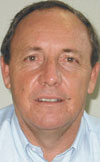
EBV has expanded its line card by including two new top suppliers – Philips Semiconductors and Samsung. An unnecessary improvement? Not according to Steve Stafford, EBV Electrolink’s managing director, who sees this as a perfect enhancement of its portfolio.

The line card of semiconductor specialist EBV now has 21 lines including the two newcomers: Philips and Samsung. Although Philips is a major broadline company - with a wide range of both design-intensive and commodity products - Steve Stafford is convinced that the right decision has been made.
"The product overlap is now at maximum 30%," says Stafford, making the product range substantially better than the previous portfolio. "More importantly, it is likely that the two new manufacturers will enable EBV to strengthen its position in sectors where it was previously only partially represented or not represented at all; and will make our range even more extensive and competitive."
This extension of the line card applies in particular, to the commodity sector. To be able to provide its customers with a competitive offering, EBV was lacking the logic, small signal and linear sectors of Philips.
"Our strategy is to bring at least the two global market leaders in each product segment to our line card," states Stafford. "Until now, we have had Texas Instruments, one of the two leaders on board, but not the second."
Furthermore, EBV has previously had only a limited offering in the memory sector. "We are making huge improvements to our product lines in this area. With Samsung's products, EBV will now be able to provide an established DRAM and SRAM selection," he says.
Similarly, with Spansion, EBV has had new technology in its portfolio for the flash sector but no serial technology. "For EEPROM products we can offer our customers products from global market leader Atmel," notes Stafford.
He adds that, in the commodity sector, the topic of competitiveness is often overestimated: "At the end of the day, it is the customer who decides which manufacturer to use and this invariably depends on the price.
"In the design-in sector, the 'rules of play' are different; if individual lines are not given enough attention, business does not improve." To this end, EBV continues to make additions to the company itself by ongoing recruitment of skilled FAEs.
The EBV philosophy is being upheld in this design segment in particular, in that no direct competitors are being placed on the line card. Stafford expects products from the new lines to increase the existing portfolio by some 40%.
"Our strategies in the areas of technical support and customer demand have changed over the last few years," he comments. "In the past, it was often the case that only one or two products were integrated per application. Now customers expect the distributor to supply the complete solution. This can only be achieved with the appropriate line range and in this respect Philips and Samsung are clearly a huge step forward."
Stafford quotes ARM as a perfect example of this: "Philips adds ARM's highly competitive technology to our range. In the past we actually lost design business because we had no appropriate solution available."
He also believes that Philips will improve the EBV range in the wired and wireless communication sectors; considerably increasing the appeal and quality of the line card.
In the analog sector, the main focus remains on the product lines of Intersil, National Semiconductor and Texas Instruments. Stafford asserts that there is little competition to these lines from the newcomers: "The EBV strategy has always been to focus on a small number of lines, but this concept only works if we concentrate on the worldwide market leaders in the respective technology segments." Several years ago, EBV also accepted niche lines into the programme but did not continue with this strategy.
"If a distributor has signed up broadline manufacturers with a wide variety of products, it becomes difficult to give them the corresponding minimum share and, at the same time, develop support-intensive unknown lines, even if their products are technically innovative and appealing," he explains.
"We must now demonstrate to our suppliers that EBV's cross-selling concept works, ie, grouping our suppliers' best products into solutions, while at the same time offering these suppliers the relevant minimum share," he says.
Stafford is confident that EBV will reach above-average growth with all its manufacturers and believes it has developed its network share substantially more than its competitors.
"The new lines will advance our market share in the automotive and consumer sectors. In the near future we will increase our focus on the power management, memory and microcontroller segments," continues Stafford.
"We expect considerable gains and our goal is, like always, to win share and grow stronger than the market," Stafford concludes.
For more information contact EBV Electrolink, +27 (0)21 402 1940, [email protected]
| Tel: | +27 11 236 1900 |
| Email: | [email protected] |
| www: | www.ebv.com |
| Articles: | More information and articles about EBV Electrolink |

© Technews Publishing (Pty) Ltd | All Rights Reserved